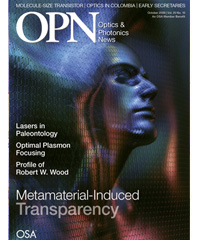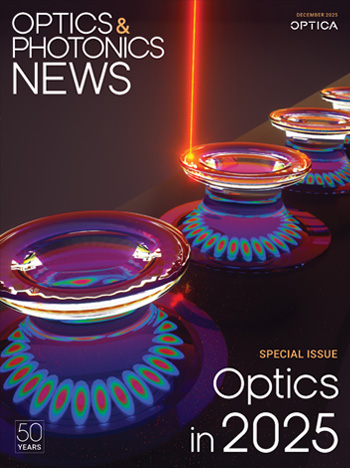
October 2009 Issue
Feature Articles
Metamaterial-Induced Transparency: Sharp Fano Resonances and Slow Light
Inspired by the study of atomic resonances, researchers have developed a new type of metamaterial. Their work paves the way toward compact delay lines and slow-light devices.
by Nikitas Papasimakis and Nikolay I. ZheludevPaleontology has come a long way since early fossil-hunters roamed the Wild West at the end of the 19th century using sharp eyes, picks and shovels to excavate bones. Now, 21st century paleontologists are using lasers to record three-dimensional images of their discoveries, to analyze fossils, and to date rocks.
by Jeff HechtOptimal Plasmon Focusing with Spatial Polarization Engineering
Scientists can now manipulate the state of polarization across a laser beam at the wavelength scale. Such engineering allows for optimal plasmonic focusing that could be translated into efficient coupling for plasmonic circuits, high-resolution imaging, biochemical sensing and thin-film characterization.
by Weibin Chen, Robert L. Nelson, Don C. Abeysinghe and Qiwen ZhanRobert W. Wood: The Scientist who Played with Optics
Robert Williams Wood viewed the natural world as his playground. For him, science was a highly creative endeavor to be approached with curiosity and awe. Wood was also a scientific maverick who questioned all dogmas. Above all, he was an experimentalist: He tested conclusions, built his own apparatuses, and was excited about every part of the process.
by Barry R. MastersDepartments and Columns
In Colombia, science and technology may be the key to future growth. For the past two decades, the Red Nacional de Optica (RNO), or Colombian National Network on Optics, has been strengthening optics research in Colombia, promoting international collaboration and opening up new possibilities for Colombian students abroad. .
Metrology of Segmented Clear Apertures
Dynamic interferometers are used throughout the world for making critical measurements of large mirrors, telescopes and other optical systems. The combination of application-specific analysis software and vibration-insensitive measurement hardware makes it possible to measure optical systems with segmented clear apertures.
A Molecule-Sized Quantum Optical Transistor
A Swiss team has shrunk the transistor nearly as far as it can go: to the size of one dye molecule.
Here we look back at the Optical Society’s early secretaries, with a special emphasis on Frank Ross, the first person to hold that position. Secretaries were charged with handling the Society’s routine business, including taking notes at council meetings, negotiating with hotels for meeting space, and notifying the membership of upcoming events. After OSA’s Executive Office was established in 1959, those functions were transferred to the executive secretary.
Strengthning NIH and Water Conservation
OSA Congressional Fellows share their views on issues at the forefront of Congressional debates.
Our conversation with Janos Kirz, expert in X-ray microscopy and FiO plenary speaker.
Pushing the Limits of Quantum Selectivity
An international research team has manipulated the pulse shapes of ultrafast lasers in order to distnguish between two molecules with identical absorption and emission spectra.
Flexible solar cell panels
Also in this Issue


![Manual probe system with needles for test of semiconductor on silicon wafer. [A. Morozov / Getty]](https://opnmedia.blob.core.windows.net/$web/opn/media/images/articles/2025/1125/departments/202511-cover-web.jpg?ext=.jpg)
![Researcher Clara Saraceno in the lab. [Image by Carsten Behler Photography]](https://opnmedia.blob.core.windows.net/$web/opn/media/images/articles/2025/1025/departments/202510-cover-web.jpg?ext=.jpg)
